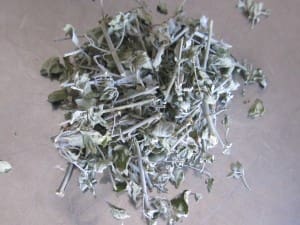“Open the door for me, Im Yaseen,” my mother-in-law says to me. I don’t have a son, but if I did, he would be named Yaseen after my father-in-law. The other daughters-in-law who do not yet have sons are also called “Im Yaseen. It’s like a placeholder for a future identity.
I hold open the screen door so she can get through with a huge metal tray piled with freshly-picked herbs. She balances it expertly on the wall of the front porch in a patch of sun so they can continue to dry.
“I like shaywa’ar more than I like maramiya,” I say reaching deep into the soft pile and inhaling deeply.
“I like maramiya better,” she says. But then, as if not to disappoint me, she adds, “and I like shaywar, too.”
“They aren’t familiar with this herb in Jerusalem. Did you know that?” The things I know better than my mother-in-law are limited to two categories: books (she is illiterate), and the world outside the Galilee (in her 73 years, she has barely traveled).
“Pick out the yellow leaves,” my mother-in-law directs me. And she goes to the backyard to bring another tray of shaywa’ar.
I pick out the yellow leaves and get hypnotized by the sweet, rich smell and the appearance of the delicate, curled leaves bursting from the little twigs. I think about the shaywa’ar I have at home in an old, plastic yogurt container that my mother-in-law gave me last time she dried a batch. I think about those little twigs and how they irritate me floating on the surface of my tea, making it hard to sip without spilling on myself. I decide, out of love for my mother-in-law, to do what she doesn’t have time to do herself—make this batch of shaywa’ar the cleanest batch ever.
I push the big pile of green-gray herbs to the far side of the tray and pull a fist -sized amount toward me. I pick up each twig. When the twigs are dry, the leaves fall right off; when the twigs are still moist with recent life, I have to pull each individual leaf to get it to release. I move the leaves to one side and make a stack of little twigs on the wall.
My mother-in-law sits next to me for a minute. Then she stands up and brings a plastic dish from the kitchen. She puts my little twigs into the plastic dish.
“Did you pick this shaywa’ar wild from the mountain?” I ask.
“No, we cultivated it in our fields.”
“From seeds?”
“From cuttings that we picked in the wild.”
“Does it grow out of control like mint?”
“No,” she answers. “Not like mint.”
And meanwhile, I am focused on cleaning every single twig of its leaves. On impressing my mother-in-law by cleaning her shaywa’ar better than it has ever been cleaned before. On building up my stack of twigs.
A young woman married to my husband’s cousin across the alley comes by for a minute and helps pick through shaywa’ar. Then she leaves. Then my husband’s uncle’s second wife comes by and pulls up a stool and starts picking at the tray. My mother-in-law stands over me although there is a chair for her to sit in.
“Hajji,” my husband’s uncle’s second wife asks my mother-in-law. “Why are you picking out those little twigs?” She gestures towards the plastic plate piled with tiny, naked twigs all lying neatly in the same direction.
“Im Yaseen did that,” she smiles at me politely.
“But they are flavorful,” my husband’s uncle’s second wife says to my mother-in-law, completely ignoring me. “Why do you waste them?”
“Oh!” I snap out of my shaywa’ar-induced trance. “Why didn’t you tell me I was doing it wrong, Hajji?”
“I told you to pick out the yellow leaves,” my mother-in-law says matter-of-factly. And she dumps the stack of neatly piled twigs in the center of the tray of leaves.
I’m not hurt. No one loves me more than my mother-in-law. But I’m a bit embarrassed. After twenty-five years in the family, I can’t do even the simplest of tasks correctly.
I lean back on the heavy plastic chair and let my hands, lightly powdered with nature’s dirt, rest in my lap. I look at the pile of twigs on top of the pile of leaves and identify with them – belonging but separate, giving flavor, but looking out of place.
